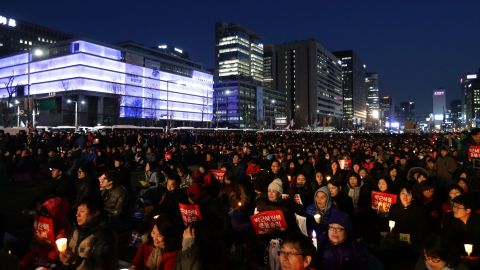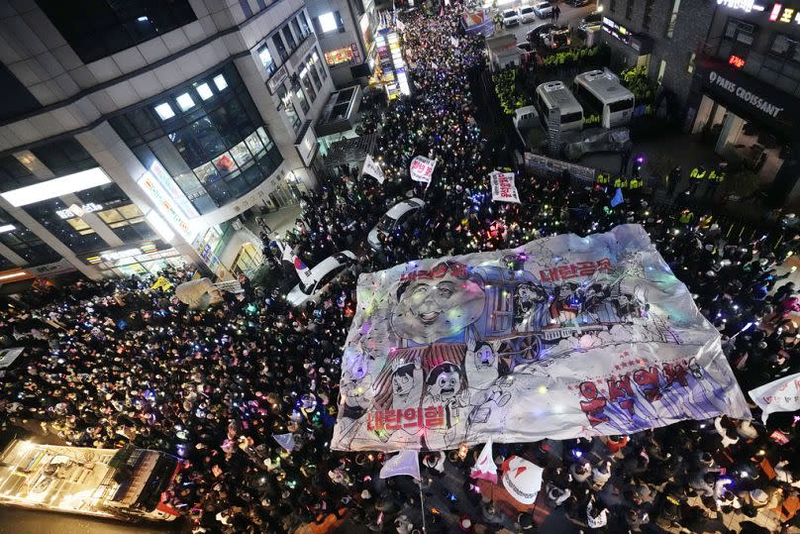The Impeachment of President Yoon Suk Yeol and the Shadows of Foreign Influence: South Korea's Political Turmoil
Input
Modified
The Crisis Emerges: Impeachment, Martial Law, and Arrest National Security Concerns and Allegations of Foreign Influence The Future of South Korea's Democracy: Economic and Social Fallout

The Crisis Emerges: Impeachment, Martial Law, and Arrest
South Korea is in political turmoil as President Yoon Suk Yeol faces impeachment and arrest after his controversial martial law declaration, igniting fierce debates over executive power and foreign interference. With deepening social divisions and economic uncertainty, the nation’s democracy stands at a critical crossroads as the Constitutional Court prepares its final ruling.
Following President Yoon Suk Yeol's impeachment, South Korea is currently in the midst of one of its most turbulent political crises in modern history. His impeachment and subsequent imprisonment were the result of his dramatic declaration of martial law on December 3, 2024, which was intended to suppress perceived anti-state activities. The situation has been further complicated by concerns regarding foreign interference, particularly from China, as the nation navigates the evolving legal and political repercussions. The prospective impact of the crisis on South Korea's democratic and economic future, the role of foreign influence, and the roots of the crisis are the subjects of this article.
President Yoon Suk Yeol declared martial law on December 3, 2024, in response to allegations that "anti-state forces" were collaborating with North Korea to undermine the nation. This move stunned the nation. The decree halted political activities, prohibited the operation of media entities that were critical of the administration, and dispatched military personnel to prevent legislators from entering the National Assembly. Opposition leaders, activists, and legal experts condemned the action as an unconstitutional power grab, prompting immediate outrage.
The reaction was immediate. Yoon was compelled to rescind his decree just six hours later after a coalition of 190 legislators convened within hours to revoke martial law. On December 4, six opposition parties-initiated impeachment proceedings against him, as his dwindling political support was exposed by the failed attempt to maintain emergency rule.
The opposition persisted, despite an initial failed vote on December 7 due to a boycott by members of his governing People Power Party (PPP). On December 14, a second impeachment motion was passed, with 204 out of 300 legislators voting in favor, resulting in Yoon's immediate suspension from office. Yoon's leadership was the subject of profound concern, as this event signified only the second impeachment of a South Korean president in history.
Yoon was confronted with additional legal complications as his political career fell apart. Following a tense standoff, authorities apprehended him at his residence on January 15, 2025. On January 26, he was formally charged with insurrection and abuse of power, becoming the first incumbent president in South Korean history to be tried while still in office. His defense team maintains that his actions were essential to safeguard national security; however, prosecutors contend that his attempt to implement martial law was an unlawful attempt to seize power.

National Security Concerns and Allegations of Foreign Influence
Allegations of foreign interference, particularly from China, emerged as the impeachment hearings progressed. According to Yoon's defense team and prominent conservative figures, the unrest that culminated in his impeachment was influenced by Chinese influence in South Korean politics. Beijing had been financing pro-China politicians, disseminating anti-Yoon propaganda, and manipulating public opinion through social media platforms and disinformation campaigns, according to these allegations.
These allegations were further exacerbated by security incidents that prompted concerns regarding China's involvement in South Korea's affairs. Reports emerged that Chinese nationals had employed drones to monitor a U.S. aircraft carrier that was moored in Busan. The subsequent investigation resulted in the identification of more than 1,300 surveillance cameras manufactured in China that were deployed in South Korean military facilities. This discovery raised concerns regarding potential espionage threats. Public sentiment against perceived foreign interference in national security matters was further exacerbated by these revelations.
China has categorically denied these accusations, characterizing them as "baseless" and accusing South Korean legislators of inciting anti-China sentiment in order to deflect attention from domestic unrest. Nevertheless, the concerns have been echoed by South Korean citizens, leading to demands for more stringent regulations on foreign investments in critical sectors such as telecommunications, technology, and media.
In addition to China, other geopolitical actors have expressed their opinions regarding the crisis. The United States reiterated its dedication to the democratic stability of South Korea, underscoring the significance of transparent legal proceedings. In the interim, Japan and the European Union have both expressed apprehensions regarding regional instability, and both have advocated for a peaceful resolution to the political impasse.

The Future of South Korea's Democracy: Economic and Social Fallout
The government has been jolted by the political unrest, which has also had an impact on the economy. In order to evaluate the crisis's influence on financial markets, the Finance Ministry has conducted emergency meetings. Investors are concerned about the long-term stability of the Kospi stock index, which has encountered an increase in volatility. Although South Korea's primary industries—including semiconductors, automotive manufacturing, and technology—continue to be resilient, the crisis has prompted international investors to exercise greater caution.
Deep social divisions have been precipitated by the impeachment on a domestic scale. In daily protests, supporters of Yoon have taken to the streets, waving South Korean and American flags and accusing liberal politicians of being influenced by communist forces. Many of Yoon's supporters are members of conservative, evangelical, and anti-communist factions, which perceive his expulsion as a politically motivated attack. These organizations have arranged prayer vigils outside the detention center where Yoon is being held, echoing slogans that are reminiscent of U.S. election disputes.
Conversely, a substantial proportion of the populace advocates for Yoon's impeachment, contending that his declaration of martial law was an obvious abuse of power. Numerous South Koreans are concerned that permitting him to continue in office following such an unconstitutional action would establish a perilous precedent for future leaders. The escalation of political violence has been a cause for concern, as confrontations have occurred in major cities as a result of the division between pro- and anti-Yoon factions.
The nation finds itself at a juncture as the Constitutional Court prepares to render its ultimate decision regarding Yoon's impeachment process. The result will not only determine Yoon's political destiny but also serve as a critical evaluation of South Korea's democratic institutions. The court's decision to maintain the impeachment will serve to bolster the constitutional checks and balances, illustrating that no leader is above the law. Nevertheless, the decision could potentially undermine democratic norms by encouraging future leaders to exercise executive power more aggressively if the court overturns it.
The impeachment of President Yoon Suk Yeol is a pivotal juncture for South Korea. It has uncovered the nation's democratic framework's resilience, raised concerns about foreign influence, and exposed deep-seated political divisions. Although South Korea has endured previous political upheavals, the resolution of this crisis will significantly influence the country's governance, economic stability, and geopolitical position for years to come. Whether South Korea emerges more fragmented or stronger will be contingent upon the manner in which its institutions, citizens, and leaders navigate the turbulent path that lies ahead.





















